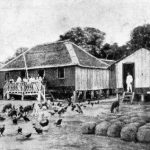Nearly half of the ten million Africans brought to the Americas over the course of the Atlantic Slave trade were brought to the shores of Brazil. Yet, despite having the largest African descended population of any country outside Africa, Brazil has long struggled to deal with the legacies of slavery and the racial equality that has persisted in its society. In the years after WWII, a new movement called teatro negro sought to put black bodies front and center in a rapidly changing Brazilian culture, a development that has been seen as political, social, and cultural. Guest Gustavo Cerqueira explores the cultural sterotypes that centuries of slavery left in post-emancipation Brazil, and the ways that teatro negro sought to re-position Afro-Brazilian people–literally–on the national stage.


